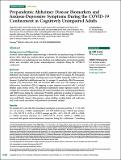Por favor, use este identificador para citar o enlazar a este item:
http://hdl.handle.net/10261/280608COMPARTIR / EXPORTAR:
 SHARE SHARE
 CORE
BASE CORE
BASE
|
|
| Visualizar otros formatos: MARC | Dublin Core | RDF | ORE | MODS | METS | DIDL | DATACITE | |

| Título: | Prepandemic Alzheimer Disease Biomarkers and Anxious-Depressive Symptoms During the COVID-19 Confinement in Cognitively Unimpaired Adults |
Autor: | Akinci, Muge; Peña-Gómez, Cleofé; Operto, Grégory; Fuentes-Julián, Sherezade; Deulofeu, Carme; Sánchez-Benavides, Gonzalo; Milà-Alomà, Marta; Grau-Rivera, Oriol; Gramunt, Nina; Navarro, Arcadi CSIC ORCID ; Minguillón, Carolina CSIC ORCID; Fauria, Karine; Suridjan, Ivonne; Kollmorgen, Gwendlyn; Bayfield, Anna; Blennow, Kaj; Zetterberg, Henrik; Molinuevo, José Luis; Suárez-Calvet, Marc; Gispert, Juan Domingo; Arenaza-Urquijo, Eider M. | Fecha de publicación: | 4-oct-2022 | Editor: | American Academy of Neurology | Citación: | Neurology 99(14): e1486-e1498 (2022) | Resumen: | Background and Objectives Increased anxious-depressive symptomatology is observed in the preclinical stage of Alzheimer disease (AD), which may accelerate disease progression. We investigated whether β-amyloid, cortical thickness in medial temporal lobe structures, neuroinflammation, and sociodemographic factors were associated with greater anxious-depressive symptoms during the COVID-19 confinement. Methods This retrospective observational study included cognitively unimpaired older adults from the Alzheimer's and Families cohort, the majority with a family history of sporadic AD. Participants performed the Hospital Anxiety and Depression Scale (HADS) during the COVID-19 confinement. A subset had available retrospective (on average: 2.4 years before) HADS assessment, amyloid [18F] flutemetamol PET and structural MRI scans, and CSF markers of neuroinflammation (interleukin-6 [IL-6], triggering receptor expressed on myeloid cells 2, and glial fibrillary acidic protein levels). We performed multivariable linear regression models to investigate the associations of prepandemic AD-related biomarkers and sociodemographic factors with HADS scores during the confinement. We further performed an analysis of covariance to adjust by participants' prepandemic anxiety-depression levels. Finally, we explored the role of stress and lifestyle changes (sleep patterns, eating, drinking, smoking habits, and medication use) on the tested associations and performed sex-stratified analyses. Results We included 921 (254 with AD biomarkers) participants. β-amyloid positivity (B = 3.73; 95% CI = 1.1 to 6.36; p = 0.006), caregiving (B = 1.37; 95% CI 0.24–2.5; p = 0.018), sex (women: B = 1.95; 95% CI 1.1–2.79; p < 0.001), younger age (B = −0.12; 95% CI −0.18 to −0.052; p < 0.001), and lower education (B = −0.16; 95% CI −0.28 to −0.042; p = 0.008) were associated with greater anxious-depressive symptoms during the confinement. Considering prepandemic anxiety-depression levels, we further observed an association between lower levels of CSF IL-6 (B = −5.11; 95% CI −10.1 to −0.13; p = 0.044) and greater HADS scores. The results were independent of stress-related variables and lifestyle changes. Stratified analysis revealed that the associations were mainly driven by women. Discussion Our results link AD-related pathophysiology and neuroinflammation with greater anxious-depressive symptomatology during the COVID-19-related confinement, notably in women. AD pathophysiology may increase neuropsychiatric symptomatology in response to stressors. This association may imply a worse clinical prognosis in people at risk for AD after the pandemic and thus deserves to be considered by clinicians. | Versión del editor: | https://doi.org/10.1212/WNL.0000000000200948 | URI: | http://hdl.handle.net/10261/280608 | DOI: | 10.1212/WNL.0000000000200948 | ISSN: | 0028-3878 | E-ISSN: | 1526-632X |
| Aparece en las colecciones: | (PTI Salud Global) Colección Especial COVID-19 (IBE) Artículos |
Ficheros en este ítem:
| Fichero | Descripción | Tamaño | Formato | |
|---|---|---|---|---|
| e1486.full.pdf | 439,37 kB | Adobe PDF |  Visualizar/Abrir |
CORE Recommender
SCOPUSTM
Citations
4
checked on 22-abr-2024
WEB OF SCIENCETM
Citations
1
checked on 19-feb-2024
Page view(s)
31
checked on 01-may-2024
Download(s)
22
checked on 01-may-2024
Google ScholarTM
Check
Altmetric
Altmetric
Este item está licenciado bajo una Licencia Creative Commons

